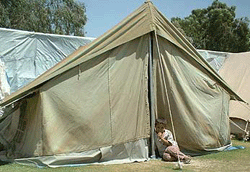|
|
"Dreaming
of return helps me survive," say Baghdad's evicted Palestinians
Melita Sunjic, UNHCR Iraq
ElectronicIraq.net, 25 June 2003

A young Palestinian refugee taking refuge in a tent at Haifa
Sports Club in Baghdad
BAGHDAD -
"I have been a refugee my whole life and I have gone through many
things, but this is the first time in my life that I am forced to live in
a tent," says 73-year-old E'tidal Muhammad, sitting in her
dust-covered tent in the Haifa Sports Club in Baghdad.
E'tidal's family is one of 800 Palestinian refugee families in Baghdad who
were evicted from their homes after the fall of Saddam Hussein's regime.
Some were given a few days' notice; some were thrown out at gunpoint by
their former landlords. At least another 200 families have been asked to
vacate their flats, such that by the end of June, the number of displaced
refugees could rise to 1,000 Palestinian families.
These Palestinians have been living as refugees in Iraq for 50 years; most
of them were born and educated here. They hold jobs in the capital and
feel fully integrated. Only a few are old enough to remember Palestine.
The previous government paid for their modest accommodation. But rents
were low, so the landlords decided to evict the refugees the moment
Saddam's regime collapsed.
E'tidal's family of 24 used to live in three rooms. "It was crowded,
but at least we had a roof to protect us from the heat," she says in
the 43°-Celsius heat. In July and August, temperatures will soar by
another 10° C.
When these Palestinians found themselves out in the street unexpectedly,
UNHCR provided some 400 tents on the premises of the Haifa Sports Club,
formerly a Palestinian centre for cultural and sports activities. Some 300
families are accommodated there, while the others found refuge with
relatives and friends.
UNHCR also distributed mattresses and blankets,
cooking pots and other domestic items to the displaced Palestinians.
At the same time, the refugee agency has set up a bus system to transport
the young Palestinians to and from school. This is because their temporary
shelters are now very far from their schools and universities, and moving
around Baghdad is not exactly safe. The transport service is especially
crucial at a time when the students are completing their classes for the
academic year.
To protect the children and the elderly from the stifling heat, UNHCR
equipped rooms in the Haifa Sports Club with air conditioning. Many people
spend their days inside; some of them even sleep there when the heat does
not subside at night.
Other adaptations had to be made. Showers and water points are nearly
finished, and a joint kitchen is under construction. A provisional
electricity network provides the tents with electrical power so they can
at least run ventilators. Each tent is equipped with a bucket of sand for
extinguishing fire. A Palestinian clinic nearby takes care of the
refugees' medical needs.
But the tented camps are only a provisional solution. UNHCR is negotiating
with the Coalition Provisional Authority to find more permanent housing
and work out a plan to use vacant government buildings to accommodate the
evicted Palestinians.
All these efforts, however, cannot undo the trauma of becoming refugees
within a society many of the Palestinians had regarded as home.
What does E'tidal hope for the future? She answers without hesitation:
"I want to see the Palestinian sun before I die," adding after a
short pause: "I know this is only a dream, but thinking of return
helps me survive this."
|

|
|



